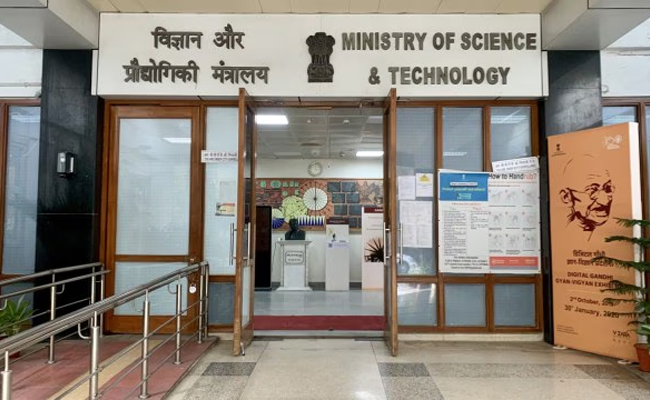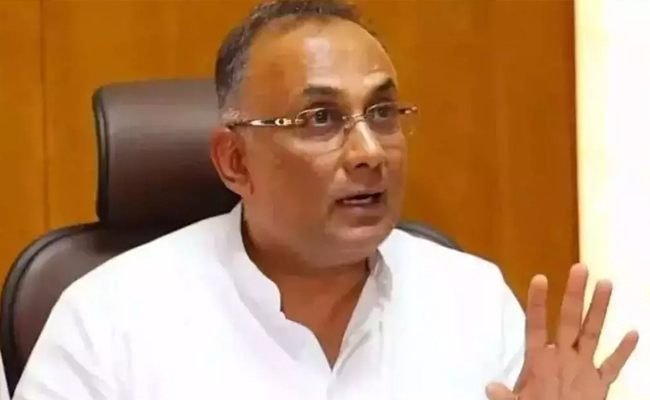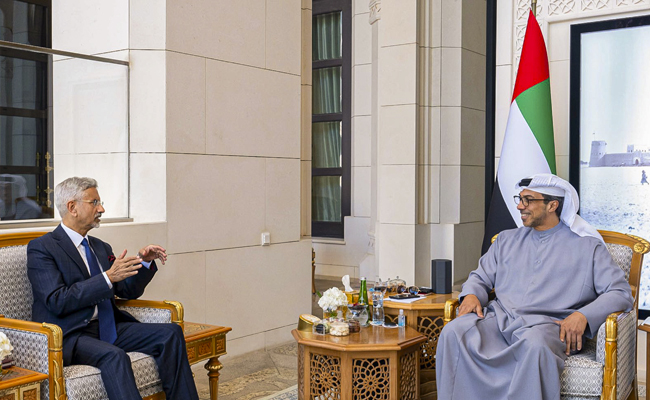Leading scientists, including some from the jury, have questioned the "integrity" of the process in light of the purported removal of three eminent scientists from the pool of candidates for the newly established Rashtriya Vigyan Puraskar (RVP). The scientists are Suvrat Raju, a physicist at Tata Institute of Fundamental Research; Prateek Sharma, a physicist at the Indian Institute of Science in Bengaluru; and Suman Chakraborty of IIT Kharagpur, who received the Infosys Prize for Engineering and Computer Science in 2022.
This is RVP's first year, and 33 winners were named in four categories: Vigyan Shri for scientists of all ages, Vigyan Yuva for scientists under 45, and Vigyan Ratna for lifetime achievement. The awards are given out in collaboration with Vigyan Teams.
Following the dissolution of previous science awards, including as the highly sought-after Shanti Swarup Bhatnagar Prize for scientists under 45, the RVP was established last year; Vigyan Yuva is the prize's replacement.
The Rashtriya Vigyan Puraskar Committee (RVPC), which is led by the Principal Scientific Advisor (PSA) to the Prime Minister, receives shortlists from subject experts as part of the selection process. The RVPC then forwards its final list to the Ministry of Science and Technology.
The government made the announcement of the awards on August 7. After this announcement The Indian Express disclosed that several members of the subject expert committees and the apex committee requested clarification from the government regarding the factors that might have affected the final list of recipients this year and led to the removal of certain names.
Thirty-six scientists, who were all Shanti Swarup Bhatnagar Award recipients, wrote to PSA Ajay Sood three weeks later on August 30 to express their concerns with the selection procedure.
The fact that two of the three scientists, Raju and Sharma, criticized IISc for abruptly calling off a discussion on UAPA last year that was supposed to be led by student activists Natasha Narwal and Devangana Kalita, has added another twist to this dispute. Additionally, the two scientists had signed open letters regarding the Bhima Koregaon case, the Citizenship Amendment Act, and the NIA.Upon being reached, Sharma informed The Indian Express that he was unaware of the RVPC's recommendation of his name and declined to comment.
Suvrat said he noticed his name was recommended by the apex committee when he received “a congratulatory message from a senior scientist involved in the selection process who assumed, in good faith, that the decisions of the scientific committee would be honoured by the government.”
"This scientist later told me that my name had been removed," Suvrat remarked. "I don't think it matters too much who the exact people who were removed were. The government's actions, which indicate intolerance for dissent, are what matter. The ramifications of such manipulations for academic freedom and democratic rights in scientific areas should worry all academics in the nation.
IIT Kharagpur student Chakraborty responded, "I don't know if my name was in the final list," when approached. All awards, meanwhile, contain a subjective aspect. I accept the ultimate judgment, and I think all the winners are worthy of recognition.
PSA Sood was not accessible for comment even after The Indian Express called and messaged him multiple times.
The government's website underlines that the Honourable Minister of Science & Technology, Government of India, would receive recommendations from the RVPC. It's interesting to note that this phrase was added just this past weekend. The website had previously simply mentioned that the RVPC will review all nominations for the award under the selection process.
The Shanti Swarup Bhatnagar Award winners have, however, questioned the PSA in their protest letter whether the recommendations of the supreme committee were adopted in their totality or changed by other bodies or authorities.
“In the latter case we request that details of the nature of these committees and the criteria employed in arriving at their decisions be made public. We request confirmation that the processes and standards used to determine Vigyan Yuva Shanti Swarup Bhatnagar awards are completely impartial, open, and devoid of any unnecessary factors in order to preserve the integrity of the Bhatnagar award, according to the letter.
Let the Truth be known. If you read VB and like VB, please be a VB Supporter and Help us deliver the Truth to one and all.
New Delhi: A bill to set up a 13-member body to regulate institutions of higher education was introduced in the Lok Sabha on Monday.
Union Education Minister Dharmendra Pradhan introduced the Viksit Bharat Shiksha Adhishthan Bill, which seeks to establish an overarching higher education commission along with three councils for regulation, accreditation, and ensuring academic standards for universities and higher education institutions in India.
Meanwhile, the move drew strong opposition, with members warning that it could weaken institutional autonomy and result in excessive centralisation of higher education in India.
The Viksit Bharat Shiksha Adhishthan Bill, 2025, earlier known as the Higher Education Council of India (HECI) Bill, has been introduced in line with the National Education Policy (NEP) 2020.
The proposed legislation seeks to merge three existing regulatory bodies, the University Grants Commission (UGC), the All India Council for Technical Education (AICTE), and the National Council for Teacher Education (NCTE), into a single unified body called the Viksit Bharat Shiksha Adhishthan.
At present, the UGC regulates non-technical higher education institutions, the AICTE oversees technical education, and the NCTE governs teacher education in India.
Under the proposed framework, the new commission will function through three separate councils responsible for regulation, accreditation, and the maintenance of academic standards across universities and higher education institutions in the country.
According to the Bill, the present challenges faced by higher educational institutions due to the multiplicity of regulators having non-harmonised regulatory approval protocols will be done away with.
The higher education commission, which will be headed by a chairperson appointed by the President of India, will cover all central universities and colleges under it, institutes of national importance functioning under the administrative purview of the Ministry of Education, including IITs, NITs, IISc, IISERs, IIMs, and IIITs.
At present, IITs and IIMs are not regulated by the University Grants Commission (UGC).
Government to refer bill to JPC; Oppn slams it
The government has expressed its willingness to refer it to a joint committee after several members of the Lok Sabha expressed strong opposition to the Bill, stating that they were not given time to study its provisions.
Responding to the opposition, Parliamentary Affairs Minister Kiren Rijiju said the government intends to refer the Bill to a Joint Parliamentary Committee (JPC) for detailed examination.
Congress Lok Sabha MP Manish Tewari warned that the Bill could result in “excessive centralisation” of higher education. He argued that the proposed law violates the constitutional division of legislative powers between the Union and the states.
According to him, the Bill goes beyond setting academic standards and intrudes into areas such as administration, affiliation, and the establishment and closure of university campuses. These matters, he said, fall under Entry 25 of the Concurrent List and Entry 32 of the State List, which cover the incorporation and regulation of state universities.
Tewari further stated that the Bill suffers from “excessive delegation of legislative power” to the proposed commission. He pointed out that crucial aspects such as accreditation frameworks, degree-granting powers, penalties, institutional autonomy, and even the supersession of institutions are left to be decided through rules, regulations, and executive directions. He argued that this amounts to a violation of established constitutional principles governing delegated legislation.
Under the Bill, the regulatory council will have the power to impose heavy penalties on higher education institutions for violating provisions of the Act or related rules. Penalties range from ₹10 lakh to ₹75 lakh for repeated violations, while establishing an institution without approval from the commission or the state government could attract a fine of up to ₹2 crore.
Concerns were also raised by members from southern states over the Hindi nomenclature of the Bill. N.K. Premachandran, an MP from the Revolutionary Socialist Party representing Kollam in Kerala, said even the name of the Bill was difficult to pronounce.
He pointed out that under Article 348 of the Constitution, the text of any Bill introduced in Parliament must be in English unless Parliament decides otherwise.
DMK MP T.M. Selvaganapathy also criticised the government for naming laws and schemes only in Hindi. He said the Constitution clearly mandates that the nomenclature of a Bill should be in English so that citizens across the country can understand its intent.
Congress MP S. Jothimani from Tamil Nadu’s Karur constituency described the Bill as another attempt to impose Hindi and termed it “an attack on federalism.”



_vb_22.jpeg)

